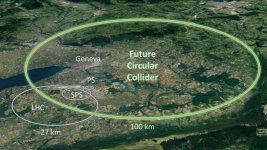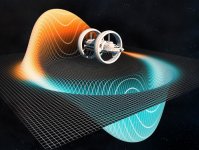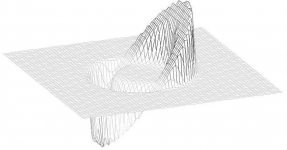I like Professor Sabine Hosenfelders blog and YouTube channel
Sabine Hossenfelder: Backreaction
Apparently, a new LHC with sufficient energies to probe deeper into the sub-atomic world is going to cost upwards of $40 billion. Her view is we need some fundamental theoretical breakthroughs first, not more money on a new LHC at this stage.
That said, Bezos could do the right thing and step up to the plate. What can one man do with $200 billion?
My answer: help science!
Sabine Hossenfelder: Backreaction
Apparently, a new LHC with sufficient energies to probe deeper into the sub-atomic world is going to cost upwards of $40 billion. Her view is we need some fundamental theoretical breakthroughs first, not more money on a new LHC at this stage.
That said, Bezos could do the right thing and step up to the plate. What can one man do with $200 billion?
My answer: help science!
If we read as far as the second argument in the article, the tone is actually quite upbeat and suggests that reports of the death of physics are greatly exagerrated!I have invested hugely in Physics over the Years. It's not working out. The End of Physics.
The author adds that understanding 5% of a subject as vast as the universe is, in itself, a wonderful achievement. The adventure has just begun!Recent advances in cosmology allow us to state, with a fair amount of certainty, that 95 percent of the universe is missing. These missing parts consist of dark matter and dark energy, both equally mysterious forms of new physics. As long as such mysteries remain the work of physics will not be complete.
Last year, Cern published its ideas for a £20bn successor to the Large Hadron Collider, given the working name of Future Circular Collider (FCC). The aim was to have the FCC hunting for new sub-atomic particles by 2050.Apparently, a new LHC with sufficient energies to probe deeper into the sub-atomic world is going to cost upwards of $40 billion.
If built, the FCC will have a circumference of 100km compared to the LHC's 27km and will be 10 times more powerful. The project was due to be considered by an international panel of physicists this year, but no doubt this has been delayed by the pandemic.
Attachments
Confusion reigns.
I'll wade through that later, but I've discovered Sabine Hossenfelder's opinion on Warp Drives and that must take precedence!Hello and welcome back to my YouTube channel. Today I want to tell you how particle physicists are wasting your money.
Warp Drive News. Seriously! - YouTube
Attachments
My answer: help science!
You actually want to help, that will never get you the 200 B$$$ in the first place.
$20Bn is not a ridiculous sum for the proposed FCC Collider whichseems 10X more powerful than the LHC. About the same as 2 channel tunnels or about a tenth of the High Speed Rail link in Britain.
The LHC is quite capable of making W, Z and Higgs bosons and the top quark. In the 100-200 GeV range. Nobody knows what lies above.
I don't know how much the James Webb Space Telescope is costing. This is hoped to find early Supernovae from about a Billion Years after the big Bang, Called the Cosmic Dark ages and a keen area for research. Very faint, these objects.
Where I get bogged down, is it seems String Theory and the Standard Model both have severe issues. We need a new way of looking at Physics. New concepts. A new view of time or information theory seem promising. And particles are not the pure identities we get used to. Neutrino oscillation is weird stuff. So is CP symmetry breaking.
Unitary Matrices have caught my attention. They are a sort of angular twist to space. Elegant things.
James Webb is costing $1Bn. I looked it up.
The LHC is quite capable of making W, Z and Higgs bosons and the top quark. In the 100-200 GeV range. Nobody knows what lies above.
I don't know how much the James Webb Space Telescope is costing. This is hoped to find early Supernovae from about a Billion Years after the big Bang, Called the Cosmic Dark ages and a keen area for research. Very faint, these objects.
Where I get bogged down, is it seems String Theory and the Standard Model both have severe issues. We need a new way of looking at Physics. New concepts. A new view of time or information theory seem promising. And particles are not the pure identities we get used to. Neutrino oscillation is weird stuff. So is CP symmetry breaking.
Unitary Matrices have caught my attention. They are a sort of angular twist to space. Elegant things.
James Webb is costing $1Bn. I looked it up.
Last edited:
The maths is way above my head: Unitary Matrix -- from Wolfram MathWorldUnitary Matrices have caught my attention. They are a sort of angular twist to space.
All I can garner is that matrix models are being used to simulate the origin of space-time.
Attachments
Where I've got to so far is that in about 1843, when Hamilton discovered his 4D Quaternions, he was significantly outvoted by the Physics community in favour of Vectors.
I always hated Vectors. Made no sense to me. My heart was never in them. Cross and Scalar product? In fact I fell out with Cambridge on the whole subject.
Time for a reset.
I always hated Vectors. Made no sense to me. My heart was never in them. Cross and Scalar product? In fact I fell out with Cambridge on the whole subject.
Time for a reset.
The more than 150 Globular Clusters (dense spheres of up to 1 million stars) within our galaxy are now thought to be the remains of the ancient galaxies that the Milky Way has gobbled up over its long history.
A previously unknown encounter with a giant galaxy, dubbed the 'Kraken', may have resulted in the largest and oldest merger in the Milky Way's history. The merger occurred 11 billion years ago when the Milky Way was only a fraction of its current size, and may have added 13 globular clusters that are still identifiable today.
Newfound 'Kraken merger' may have been the biggest collision in Milky Way's history | Space
A previously unknown encounter with a giant galaxy, dubbed the 'Kraken', may have resulted in the largest and oldest merger in the Milky Way's history. The merger occurred 11 billion years ago when the Milky Way was only a fraction of its current size, and may have added 13 globular clusters that are still identifiable today.
Newfound 'Kraken merger' may have been the biggest collision in Milky Way's history | Space
Attachments
Perhaps we should call in the plumber!Things are getting pretty heated.
Attachments
The serious answer is that currently sending humans into Space is just a waste of time and money:
These photos show life on the ISS in extraordinary detail | WIRED UK
Very little is learned except that Space is extremely hostile to Humans. Radioactivity, null gravity an' all that.
I have no want to go into Space:
Should astronauts abandon the space station? - BBC Future
I'm all for sending Robots into Space. But, me, I'd rather stay at home.
These photos show life on the ISS in extraordinary detail | WIRED UK
Very little is learned except that Space is extremely hostile to Humans. Radioactivity, null gravity an' all that.
I have no want to go into Space:
Should astronauts abandon the space station? - BBC Future
I'm all for sending Robots into Space. But, me, I'd rather stay at home.
- Status
- Not open for further replies.
- Home
- Member Areas
- The Lounge
- What is the Universe expanding into..




